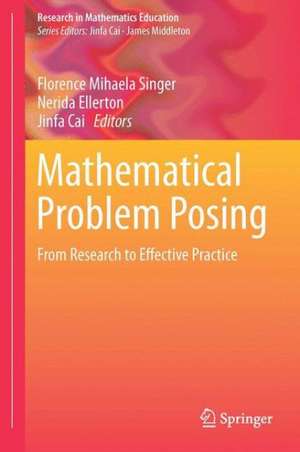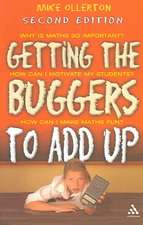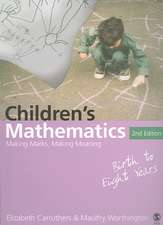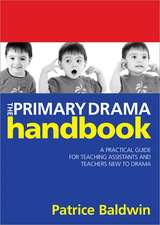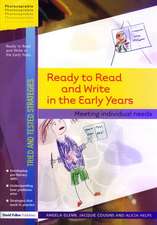Mathematical Problem Posing: From Research to Effective Practice: Research in Mathematics Education
Editat de Florence Mihaela Singer, Nerida F. Ellerton, Jinfa Caien Limba Engleză Hardback – 15 iun 2015
| Toate formatele și edițiile | Preț | Express |
|---|---|---|
| Paperback (1) | 1122.42 lei 6-8 săpt. | |
| Springer – 9 oct 2016 | 1122.42 lei 6-8 săpt. | |
| Hardback (1) | 1128.70 lei 6-8 săpt. | |
| Springer – 15 iun 2015 | 1128.70 lei 6-8 săpt. |
Din seria Research in Mathematics Education
- 24%
 Preț: 714.25 lei
Preț: 714.25 lei -
 Preț: 279.23 lei
Preț: 279.23 lei - 24%
 Preț: 841.84 lei
Preț: 841.84 lei - 15%
 Preț: 585.63 lei
Preț: 585.63 lei - 18%
 Preț: 1114.96 lei
Preț: 1114.96 lei - 18%
 Preț: 946.72 lei
Preț: 946.72 lei - 18%
 Preț: 1121.13 lei
Preț: 1121.13 lei - 15%
 Preț: 592.83 lei
Preț: 592.83 lei - 15%
 Preț: 648.56 lei
Preț: 648.56 lei - 15%
 Preț: 661.32 lei
Preț: 661.32 lei -
 Preț: 386.88 lei
Preț: 386.88 lei - 18%
 Preț: 1119.71 lei
Preț: 1119.71 lei - 15%
 Preț: 458.36 lei
Preț: 458.36 lei -
 Preț: 453.78 lei
Preț: 453.78 lei -
 Preț: 388.03 lei
Preț: 388.03 lei -
 Preț: 390.32 lei
Preț: 390.32 lei - 15%
 Preț: 579.74 lei
Preț: 579.74 lei - 18%
 Preț: 1117.19 lei
Preț: 1117.19 lei - 18%
 Preț: 951.77 lei
Preț: 951.77 lei - 18%
 Preț: 1398.80 lei
Preț: 1398.80 lei -
 Preț: 382.64 lei
Preț: 382.64 lei -
 Preț: 393.62 lei
Preț: 393.62 lei - 18%
 Preț: 1123.19 lei
Preț: 1123.19 lei - 15%
 Preț: 654.41 lei
Preț: 654.41 lei - 18%
 Preț: 1118.62 lei
Preț: 1118.62 lei - 18%
 Preț: 1114.34 lei
Preț: 1114.34 lei -
 Preț: 384.17 lei
Preț: 384.17 lei - 18%
 Preț: 1014.28 lei
Preț: 1014.28 lei - 15%
 Preț: 584.98 lei
Preț: 584.98 lei -
 Preț: 388.79 lei
Preț: 388.79 lei - 18%
 Preț: 900.49 lei
Preț: 900.49 lei - 15%
 Preț: 587.10 lei
Preț: 587.10 lei - 15%
 Preț: 654.95 lei
Preț: 654.95 lei -
 Preț: 395.34 lei
Preț: 395.34 lei - 18%
 Preț: 1008.28 lei
Preț: 1008.28 lei - 15%
 Preț: 647.92 lei
Preț: 647.92 lei -
 Preț: 382.04 lei
Preț: 382.04 lei
Preț: 1128.70 lei
Preț vechi: 1376.47 lei
-18% Nou
Puncte Express: 1693
Preț estimativ în valută:
216.00€ • 234.55$ • 181.44£
216.00€ • 234.55$ • 181.44£
Carte tipărită la comandă
Livrare economică 22 aprilie-06 mai
Preluare comenzi: 021 569.72.76
Specificații
ISBN-13: 9781461462576
ISBN-10: 1461462576
Pagini: 544
Ilustrații: XXXI, 569 p. 148 illus., 52 illus. in color.
Dimensiuni: 155 x 235 x 38 mm
Greutate: 1.02 kg
Ediția:2015
Editura: Springer
Colecția Springer
Seria Research in Mathematics Education
Locul publicării:New York, NY, United States
ISBN-10: 1461462576
Pagini: 544
Ilustrații: XXXI, 569 p. 148 illus., 52 illus. in color.
Dimensiuni: 155 x 235 x 38 mm
Greutate: 1.02 kg
Ediția:2015
Editura: Springer
Colecția Springer
Seria Research in Mathematics Education
Locul publicării:New York, NY, United States
Public țintă
ResearchCuprins
Mathematical Problem Posing Practices and Research: 1970-2010.- Problem Posing From a Modelling Perspective.- Conceptualizing Problem Posing Via Transformation.- Developing a Problem-Posing Pedagogy From the History of Mathematics.- On the Relationship Between Problem Posing, Problem Solving and Creativity.- Is Problem Posing a Tool for Developing Mathematical Creativity?.- Using Digital Technology for Mathematical Problem Posing.- Problem Posing in Mathematics – The Relevance of Philosophy for Children (P4C).- Problem Posing as Lenses for Understanding and Improving Students’ Learning of Mathematics.- Examining Problem Posing in Different Grade Levels: How Students Posed Problems-To-Solve.- Problem Posing by Way of Mediated Activity at Grades Four and five.- Enhancing the Development of Chinese Fifth-Graders’ Problem Posing and Problem Solving Abilities, Beliefs and Attitudes: A Design Experiment.- If You Don't Know Why Do You Ask?.- Problem Posing to Provide Students with Content Related Motives to Proceed.- Providing Elementary Students with Opportunities to Pose problems Through Data Modeling.- Mathematical Problem Posing Activities Using Computers.- An Investigation of High School Students’ Mathematical Problem Posing in the United States and China.- Studying the Evolution of Problem Posing in Relatively Constrained Situations.- Mathematical Problem Posing in Chinese Classrooms.- Problem Posing as a Pedagogical Strategy: A Teacher's Perspective".- Problem Posing as a Motivational Tool in Primary School Teachers Training.- In-Service Mathematics Teachers as Composers of Problems for Their Teaching: A Preliminary Study.- The Poznan Theater Problem: Exploring Problem-Posing and Problem-Solving in the Route to Self-Guided Discovery in Developmental Mathematics Classes.- Problem Posing in a Collegiate Geometry Class.- From Proof to Investigations and Back to Proof in Geometry.- Developing the Problem Posing Abilities of Prospective Elementary and Middle School Teachers.- Conceptualizing Problem Posing Through Teachers’ Thinking in Posing Mathematical Word Problems.- Problem Posing in the Training of Prospective Elementary Teachers: A Review.- Problem Posing as an Integral Component of the Mathematics Curriculum: A Study with Prospective Middle-School Teachers.
Recenzii
“This edited book of 26 chapters is divided intofour parts: defining the field; mathematical problem posing in the schoolcurriculum, mathematical problem posing in teacher education, and concludingremarks. … there are many examples of problem-posing tasks scattered throughoutthe book’s many chapters. … the book is for mathematics education graduatestudents, but it could also be useful for mathematics teachers at a variety oflevels who could gain ideas and tasks for classroom use.” (Annie Selden, MAAReviews, maa.org, January, 2016)
Notă biografică
Florence Mihaela Singer is a full professor in the Teacher Training Department of the University of Ploiesti, Romania. Her expertise is in curriculum design and development (all grades, all subjects for pre-university education), curriculum administration, teacher training, textbook development (mathematics), Educational management, and international consultancy in education.
Dr. Nerida Ellerton has two doctoral qualifications: one in theoretical and physical chemistry and one in mathematics education. She is an experienced teacher, with a specialist focus on mathematics and has taught at elementary, secondary and college levels. She was Dean of the Faculty of Education at the University of Southern Queensland for four years and is currently a full professor at Illinois State University in the Department of Mathematics.
Dr. Jinfa Cai is an affiliated Full Professor in the School of Education at the University of Delaware. His primary appointment is in the Department of Mathematical Sciences. His research interests include cognitive studies of the teaching and learning of mathematics, mathematical assessment, cross-cultural studies, problem solving and teacher education.
Dr. Nerida Ellerton has two doctoral qualifications: one in theoretical and physical chemistry and one in mathematics education. She is an experienced teacher, with a specialist focus on mathematics and has taught at elementary, secondary and college levels. She was Dean of the Faculty of Education at the University of Southern Queensland for four years and is currently a full professor at Illinois State University in the Department of Mathematics.
Dr. Jinfa Cai is an affiliated Full Professor in the School of Education at the University of Delaware. His primary appointment is in the Department of Mathematical Sciences. His research interests include cognitive studies of the teaching and learning of mathematics, mathematical assessment, cross-cultural studies, problem solving and teacher education.
Textul de pe ultima copertă
This international review offers current findings on the art and science of problem posing and its multiple contributions to mathematics teaching, learning, training, and curriculum design. Diverse perspectives on problem posing frame the concept as a springboard for scientific inquiry and the process as a means to promote mathematical understanding across the primary and secondary grades. Problem posing is demonstrated as enhancing students' problem-solving skills, bolstering knowledge retention, and improving attitudes toward mathematics, and the book provides evidence-based strategies for its integration into both classroom work and teacher education. This information is particularly critical as mathematics-based knowledge continues to dominate technology and the sciences.
Among the topics covered:
For mathematics educators as well as mathematics education researchers, Mathematical Problem Posing brings clarity and innovative understanding to a central element in the continuing progress of the field.
Among the topics covered:
- Using digital technology for mathematical problem posing.
- Problem posing as a tool for identifying and developing mathematical creativity.
- Problem posing as providing students with content-specific motives.
- What high school teachers mean when they say "I pose my own problems."
- Problem posing as a motivational tool in primary school teacher training.
- Problem posing as an integral component of the mathematics curriculum.
For mathematics educators as well as mathematics education researchers, Mathematical Problem Posing brings clarity and innovative understanding to a central element in the continuing progress of the field.
Caracteristici
Describes significant trends of problem posing in school mathematics Outlines the importance of appropriate problem posing in the classroom Illustrates problem posing technique for pre-service teachers Investigates the impact of problem posing and problem solving activities utilizing cultural artifacts
